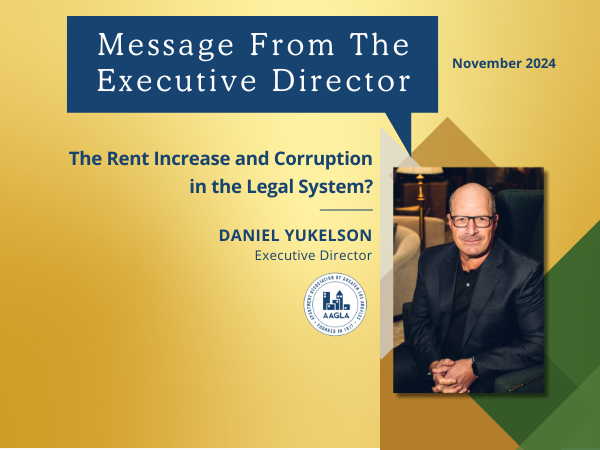Message from the Executive Director November 2024
Executive Director Message

This month, rather than my usual commentary, I wanted to share a couple of stories that have been reported to me. There may be some lessons to learn here.
The Rent Increase and Corruption in the Legal System?
Recently, I learned about an elderly property owner in his late 70s who rents out a single-family home in the Los Angeles area. This owner, in poor health and needing caregiver support, inherited the home from his brother a few years ago, which led to a property tax reassessment by the County Assessor. As a result, his annual property tax jumped from approximately $2,000 to over $10,000, and he was retroactively billed about $45,000.
Since 1996, the owner has rented the home for $1,699 per month. By October 2023, the rent had only reached $2,450. Under the Costa Hawkins Rental Housing Act, he could legally increase the rent without restriction. To cover the unexpected tax burden, he issued a “Ninety (90) Day Change in Terms” notice, requesting a $1,500 increase, bringing the rent to $3,950—still below the market rate for similar homes. This modest increase would amount to just $80 more per month each year over the 28-year lease term. However, as the saying goes, no good deed goes unpunished.
The tenant responded by withholding rent immediately upon receiving the notice, subsequently hiring BASTA, a prominent tenant rights organization in Southern California. The situation spiraled downhill from there.
After eight months with no rent payments and a mandatory settlement attempt ordered by the court, the tenant, guided by BASTA, refused to negotiate. The tenant’s attorney threatened prolonged litigation, potentially extending the case for another two years, and urged the owner to settle. This feels like extortion, doesn’t it?
To avoid further losses, the owner offered to forgive the unpaid rent if the tenant would agree to the $3,950 monthly rate moving forward. The tenant declined.
This poor owner, already facing significant financial strain due to health and taxes, has received no income for nearly nine months, with no trial date in sight as the courts are heavily backlogged. This is the unfortunate reality in today’s regulatory environment, where the scales are tipped unfavorably against rental property owners. Tenants, seen as temporary residents, seem to hold all the leverage, often with the support of regulators and the judiciary. Something needs to change.
I’ll try to provide an update once this case is resolved. Until then, we can only hope for a favorable and swift outcome. But perhaps, sometimes, a rent increase of this size is like “poking the bear.”
Beware of Section 8 Entrapment
A young family with three school-aged children recently listed their one-bedroom condominium in Los Angeles for rent on Zillow after their long-term tenants moved out. They received an inquiry that initially seemed typical—the caller asked about the property’s availability and the owners confirmed. When asked if they accept Section 8 vouchers, the owners replied, “Unfortunately, the property isn't onboarded for the Section 8 program.”
That’s where things took a turn.
The caller never applied or attended the open house. In hindsight, the owners now regret not answering differently, even with a simple “YES.” Their response was intended to be informative, explaining potential delays related to Section 8 inspections, but they later realized they had likely been set up.
Weeks later, the family found themselves blindsided by a lawsuit accusing them of multiple infractions, including violations of the Fair Employment and Housing Act and Unruh Civil Rights Act. They discovered that at least 33 similar lawsuits had been filed by the same plaintiff and attorney within the previous month, targeting landlords across Los Angeles County. Another individual had filed approximately 25 similar cases.
These lawsuits, typically settled out of court, are emotionally and financially draining for small property owners. For this young family, it has been devastating. The father is the sole provider, the mother is studying nursing, and they had just managed to save enough to buy a home. Now, they face a lawsuit that could potentially cost thousands, threatening the stability they’ve worked so hard to build.
It’s disheartening to see these kinds of predatory legal tactics that exploit small “mom and pop” landlords. Many others likely face similar situations. Landlords, be aware! Share this story with friends and family who own rental property in this challenging state.
Understanding California’s Source of Income Discrimination Laws
In California, housing discrimination based on a person’s income source, including Section 8 vouchers, is illegal. Landlords cannot refuse to rent to someone simply because they have a Section 8 voucher. Examples of prohibited discrimination include:
- Refusing to comply with housing subsidy program requirements
- Applying different terms based on income source
- Advertising a preference or limitation based on income source
- Stating "No Section 8" or "No Vouchers" in rental advertisements
- Asking if someone has Section 8 before providing an application
Landlords need to be mindful of these regulations to avoid potential legal traps.
Daniel Yukelson is currently the Executive Director of The Apartment Association of Greater Los Angeles (AAGLA). As Certified Public Accountant, Yukelson began his career at Ernst & Young, the global accounting firm, and since then had served in senior financial roles principally as Chief Financial Officer for various public, private and start-up companies. Prior to joining AAGLA, Yukelson served for 12 years as Chief Financial Officer for Premiere Radio Networks, now a subsidiary of I-Heart Media, and then 3 years as Chief Financial Officer for Oasis West Realty, the owner of the Beverly Hilton and Waldorf Astoria Beverly Hills where he was involved with the development and construction of the Waldorf. Yukelson also served for 6 years as a Planning Commissioner and for 3 years as a Public Works Commissioner for the City of Beverly Hills.
